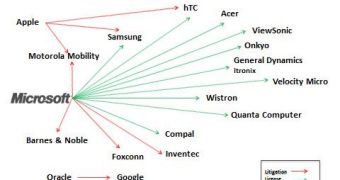Only some 45% of all Android devices worldwide still need intellectual property coverage from Microsoft.
At the end of the past week, the Redmond company announced a new patent license agreement with Taiwan-based original design manufacturer Compal Electronics.
The newly inked deal is synonymous with an important milestone for Microsoft’s Android licensing program, which has expanded in size tremendously, and now covers no less than 55% of all devices running Google’s open platform.
The agreement with Compal is the software giant’s tenth Android-related deal, and ninth in the past four months, according to Brad Smith, Microsoft Executive Vice President and General Counsel, and Horacio Gutierrez Microsoft Corporate Vice President and Deputy General Counsel.
“More important, today’s announcement means that companies accounting for over half of all Android devices have now entered into patent license agreements with Microsoft,” Smith revealed.
The Redmond company revealed that the patent license agreement with Compal covers tablets, mobile phones, e-readers as well as other devices that leverage not only Android but also Chrome.
As usual, neither party disclosed the terms of the deal, or the financial details, although, Compal will pay IP royalties to Microsoft for the use of Android.
“We are pleased to have reached this agreement with Compal, one of the leaders in the original design manufacturing, or ODM, industry. Together with the license agreements signed in the past few months with Wistron and Quanta Computer, today’s agreement with Compal means more than half of the world’s ODM industry for Android and Chrome devices is now under license to Microsoft’s patent portfolio,” Gutierrez noted.
“We are proud of the continued success of our licensing program in resolving IP issues surrounding Android and Chrome.”
It should be clear by now that Microsoft is not going to stop until it receives royalties for every Android and Chrome device on the market. Those companies thinking otherwise risk entering a long and costly legal battle with the Redmond giant, and there are a few that did just that, including Foxconn, Motorola Mobility and Barnes & Noble.
Microsoft executives have always stressed that they prefer patent license deals to lawsuits, but the company is certainly not holding back any punches.
“For those who continue to protest that the smartphone patent thicket is too difficult to navigate, it's past time to wake up,” Smith said.
“As Microsoft has entered new markets from the enterprise to the Xbox, we’ve put together comprehensive licensing programs that address not only our own needs but the needs of our customers and partners as well. As our recent agreements clearly show, Android handset manufacturers are now doing the same thing. Ultimately, that's a good path for everyone.”

 14 DAY TRIAL //
14 DAY TRIAL //